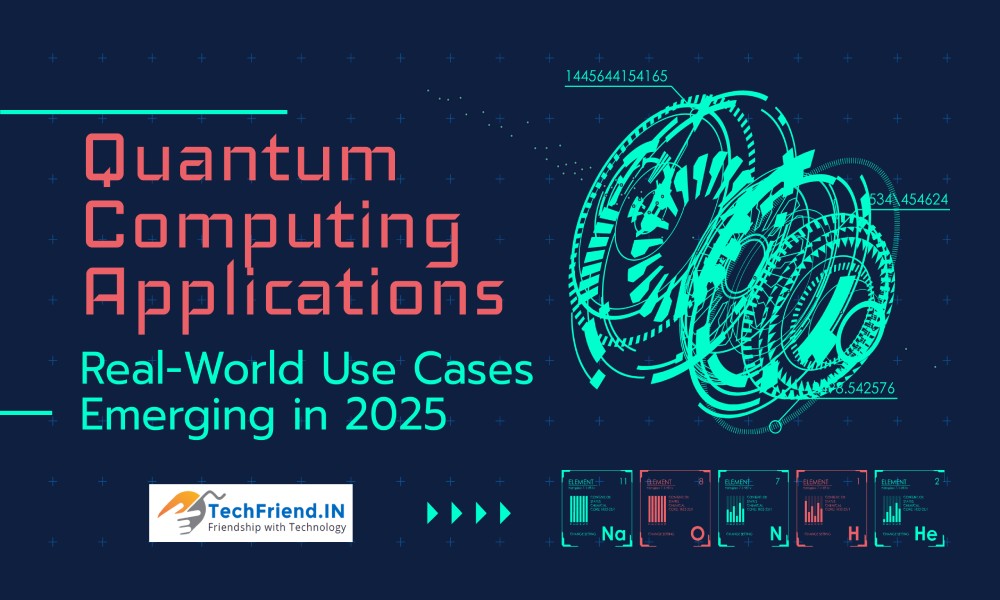Moving further into 2025, quantum computing is starting along the long-expected path of moving out of research labs and into implementations across various industries. The tech, which harnesses the principles of quantum mechanics, is now addressing real-world jobs that classical computers are unable to tackle. Hence let us explore the top applications of quantum computing which are going to revolutionize the horizon of technology.

Financial Services Revolution
One of the earliest adopters of quantum computing was the financial sector. Multinational corporations like JPMorgan Chase and Goldman Sachs have used quantum algorithms for portfolio optimization and risk analysis. These applications can compare multiple variables simultaneously, allowing them to create a more accurate market prognosis and a better risk management plan.
Such as the development of quantum enhanced systems for fraud detection. The same systems can perform real-time analysis of massive amounts of transactional data, enabling them to swiftly identify transactions that are subject to additional anomalies that cannot be detected by classical computing systems. Quantum-assisted algorithms reportedly yield 35% improvements for financial institutions.
Revolutionizing Drug Discovery with Technology
Pharmaceutical research is perhaps the best use case there is for quantum computing or at least the most impactful application to date by 2025. Quantum computers are also better at simulating molecular interactions, which can help to accelerate the drug discovery process. The conventional drug development process is a 10- to 15-year and multi-billion dollar undertaking. Quantum computing is slashing this timeline.
Researchers from leading pharmaceutical companies are deploying quantum computers to:
- Outperform all existing methods for predicting protein folding
- Screen millions of potential drugs, in days rather than years
- Predict more accurate Drug-Protein Interactions
- Strengthen drug delivery mechanisms
Climate Change Solutions
Quantum computing is proving crucial in combating climate change problems. Quantum simulations are being used by scientists to develop better carbon-capture methods and to develop improved flow batteries for renewable energy storage.
The most common application is weather forecasting and climate modeling. Climate models will be crisper, courtesy of quantum computers: Quantum computers can process complex atmospheric data more efficiently than classical computers. This is important for:
- Forecasting extreme weather events
- Optimization of Renewable Energy Deployment
- All mitigation strategies against climate change
- Improving planning for agriculture
Supply Chain Optimization
The complexity of the global supply chain network continues to grow and organizations are starting to adapt quantum computing to optimize their logistics operations. It is 2025 and we are seeing quantum algorithms being used for:
- Utilize real-time data to determine optimal delivery routes
- Have stock in multiple locations
- Predict and avoid disruptions in the supply chain
- Cuts transportation costs and carbon emissions
Cybersecurity and Encryption
In cybersecurity, quantum computing is a double-edged sword. This could eventually prove a significant threat to current encryption techniques — especially RSA and ECC (Elliptic Curve Cryptography) — but it is also driving the creation of quantum-resistant security solutions. If the government could build a quantum computer that could factor large numbers into their prime components far more quickly than current classical computers are able to do today, that could crack the vast majority of encryption used now, creating what the cyber experts have called a “quantum apocalypse.”
That said, organizations aren’t sitting on their hands. Some big tech firms and financial institutions are in various stages of deploying quantum-resistant cryptography, or post-quantum cryptography (PQC). New methods of creating encryption that can resist attacks from both classical and quantum computers. NIST has already standardized several promising PQC algorithms: CRYSTALS-Kyber for key encapsulation and CRYSTALS-Dilithium for digital signatures.
The solution emerging here is Quantum Key Distribution (QKD), which uses principles of quantum mechanics to create theoretically uncrackable encryption keys. Innovative organizations are building quantum-secure networks today with QKD technology. Every major player in banking, healthcare, and government right now is upgrading their systems for quantum-safe security, with most companies planning to be fully transitioned by 2026.
Moreover, quantum computing additionally offers advanced security functions. Quantum random number generators generate true randomness for stronger encryption keys, and quantum sensors can detect attempts at illicit monitoring. When companies have such quantum protection systems, they can monitor and prevent a significant increase in sophisticated efforts at cybercrime.
Pushing the envelope in terms of technological advancement, the race to address quantum computing risks while reinforcing and creating quantum-safe solutions has unlocked collaboration on an unprecedented scale amongst industry frontrunners, academia, and government agencies, generating rapid advancements in cryptographic security.
Challenges and Future Outlook
Though, with these exciting use cases, also much about quantum computing is challenging:
- Hardware scalability
- Error correction
- Quantum decoherence
- Skilled workforce shortage
Conclusion
Fast forward to 2025, and quantum computing has shifted seamlessly from an academic concept to a viable solution tackling real-world issues. It can be applied to fields ranging from drug discovery to climate change mitigation in ways we’ll soon describe. Analysts expect the businesses that embrace quantum computing early will bring a valuable competitive advantage to their sectors.


